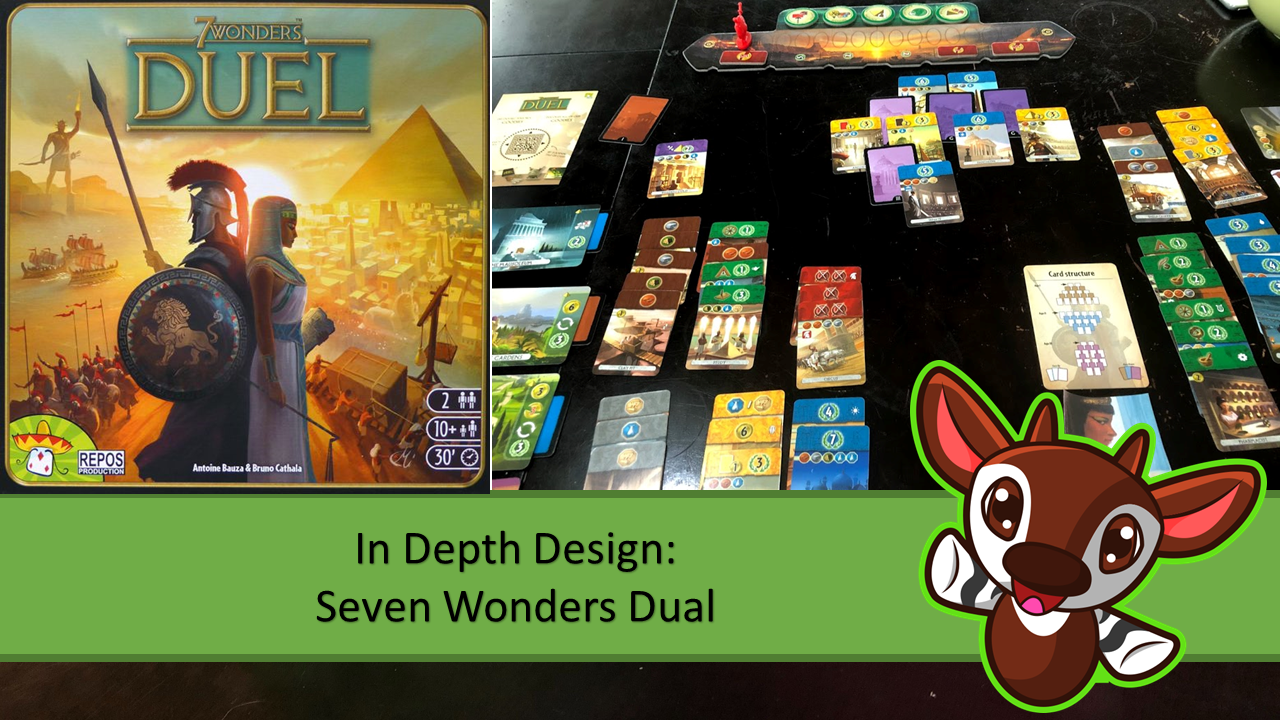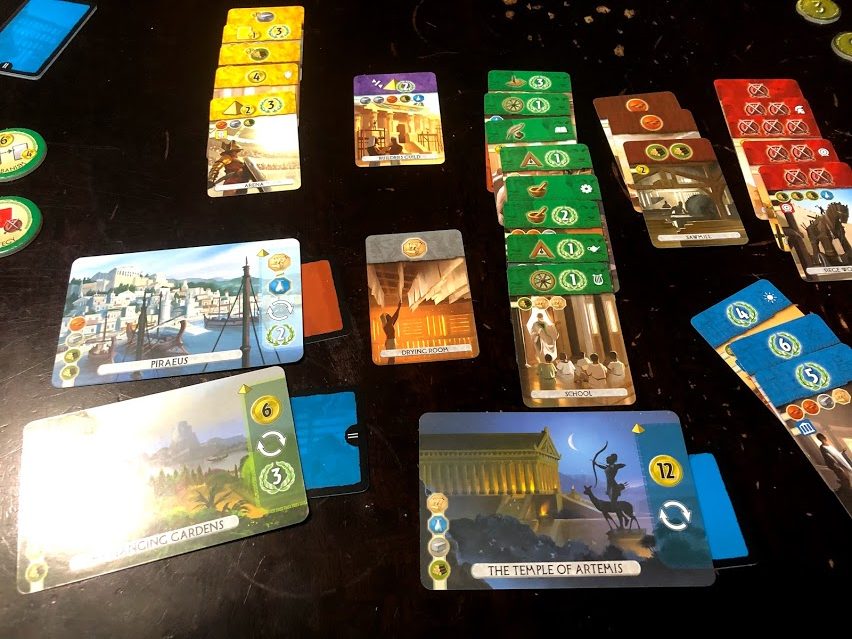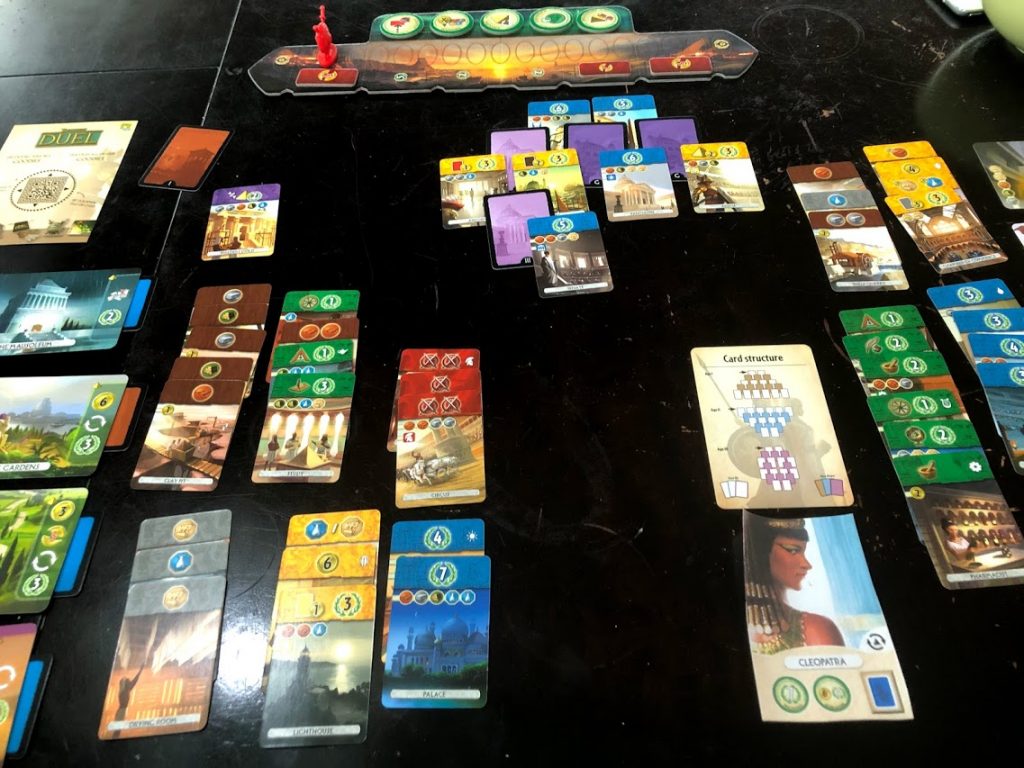
I initially picked up this game as I wanted to experience more games that are specifically made for two players, to see what sort of design decisions go into that specific experience and I was not disappointed at all with 7 Wonders Duel.
Multiple Win Conditions
Players can win in three ways: by having a certain amount of military prowess above the other player, by getting six of the seven types of science buildings, or by having the most points at the end of the game.
I think this works out very well for a two-player-only game. If a game meant for more players had this many things to watch out for, I would not enjoy it; it’d simply be too much to pay attention to two or three other players’ scores, science buildings, let alone constantly comparing everyone’s military prowess. Worse yet, there would be a constant struggle to figure out what strategies they’re each using and counter them! However, with only one other player to watch, this becomes something you can easily handle.
Resource Prices Dependent on Opponent
Each player can build buildings that give resources, like wood, clay, and stone. Some buildings and your Wonders require these resources before you can build them. If you haven’t built the right buildings, you can buy the resources…but the price depends on what the other player has built. For instance, if I grab all the clay buildings and I can produce clay, then the price of clay is much higher than it would otherwise be. So, you must be very cognizant of what resources the other player needs for their Wonder and what they’re building, or else you might get stuck paying a lot more for a building, or worse yet, being unable to afford to build your Wonder.
Card Pyramids
When you’re choosing your cards, you get to choose based on a card pyramid: you can only take cards that are at the very bottom of the pyramid and have no other cards on top of them. One neat aspect of this with 7 Wonders Duel is that the cards alternate in rows that are face up and face down. This means you can somewhat plan for the end of the round…but you can’t plan for everything. When you’re choosing a card, you’re not just choosing a card, you’re also potentially choosing whether a mystery card will be revealed or allow a player access to a known card. This adds a lot of depth to your choice and can change up the game depending on what cards are revealed each game.
Certain Number of Wonders
The game is called 7 Wonders Duel…. which means that there can only be seven Wonders built in each game. Each player can potentially build four Wonders, but since only one player can build four, it’s a race!

This leads to interesting decisions. You can try to build your Wonders from easiest to hardest to try to race through them, or you can focus on the Wonders that will get you the best effects and hope that creates a domino effect to help build the remaining Wonders.
Guild Cards
Guild cards are cards that typically give points equal to the number of buildings of a certain type (or Wonders) that are built by the player who has built the most of them. That is, the guilds are the same number of points regardless of who gets them, though you can specifically give yourself more points for them if you’re the one who built most of the specified type of cards. This also makes it risky to focus in one area too much; you can end up giving a lot of points to someone else if they manage to build the guild before you do.
Compared to the Original Game
I haven’t played 7 Wonders in years, but it was definitely a favorite of mine when I first got into hobby gaming. I liked the fact that I could easily get into 7 Wonders Duel, as a lot of the icons and mechanics are similar. 7 Wonders Duel was definitely updated to be more modern and work better for the two-player experience. 7 Wonders didn’t have the multiple paths to victory or the tension of being able to plan as much and focus on just one opponent.
I think it was nice that the Science and Military were kept in the game and still paths to victory, though they were a bit more streamlined in Duel. Science was definitely a way that I won frequently in Seven Wonders and it’s so much more exciting as an instant win condition versus something you’d have to total up at the end alongside other points.
The same goes for Military; it was certainly a way to win in 7 Wonders, but you’d have to compare your military to the players on each side of you and slowly gain points, whereas in Duel it’s another instant win condition.
I like both of these changes because it’s not particularly fun to add up a bunch of numbers at the end of a game. Being able to skip that and just know who won is nice.
The guild cards also got an upgrade in 7 Wonders Duel. In 7 Wonders they tended to be based on how many buildings were built by yourself and the people to your left and/or right; in 7 Wonders Duel, they’re just based on who built the most. I think this was a good move, as there were times in 7 Wonders that someone would hate-draft a guild card (take the guild card solely to prevent someone else from getting a lot of points). It doesn’t feel good to hate draft most of the time, so I really like this change.
Also, while 7 Wonders was a drafting game, 7 Wonders Duel has a card pyramid to draw from. This is a really nice way to upgrade the game as the card pyramid lowers the number of choices the player can make and allows them to plan better, but not perfectly. It also puts players on more even footing as some players can remember all the cards they’ve passed along and others cannot.
After experiencing 7 Wonders Duel, I’ll most likely pass on the chance to play 7 Wonders, unless a friend really wants to play it. I prefer Duel that much!
Solo Game
This solo game for 7 Wonders Duel is a bit different than most solo modes I’ve come across, mostly because while it’s an official solo mode, it’s available via print and play. I haven’t seen this before, but it might be more prevalent than I know as I don’t usually go searching online for solo modes. I bought 7 Wonders Duel in part because I’d heard the solo mode was great, and then had to go online looking for it as I saw no mention of it in the rulebook and was confused.
So! I think most people would know of this solo mode from word of mouth, which is definitely interesting from a publishing perspective. I’d also love to know how it’s generally seen to have the solo mode of a game only available as a print and play. It was only a minor inconvenience for me, but I also make print and plays rather frequently, so I have the tools on hand to do so quickly.

Anyway, the solo mode is quite good, in part because the two-player game is quite good. I enjoyed playing against the Robot player and appreciated that there were a few different Robot players to play against, each with a slightly different strategy, though they used the same main method to decide how they play. The Robot player has its own deck, and when you flip a card, it says the priority order of what the Robot is looking for where it will take from.
The Robot focuses on taking cards that are green, red, or the color of its choice, which depends on the certain Robot personality you are facing. This means that the Robot goes for each of the three win conditions: Science (green cards), Military (red cards), and points (the rest of the cards).
The solo mode is tough because you still have to watch out for all three of those factors; you can’t just focus on one thing and ignore the Robot. You’ll have to have to fight it on multiple fronts at once, which is engaging but still easy to manage.
Did you enjoy this entry? Have you played 7 Wonders Duel before? What did you think was the most innovative aspect of the game? Please let me know! I’d love to hear what you think and what kind of things you’d like to see from this blog. Feel free to send me an email or comment with your thoughts!